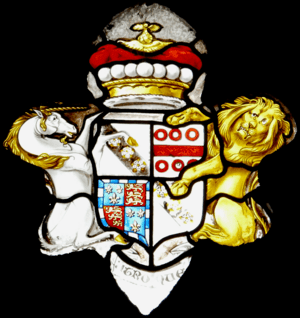Lucius Cary, 6th Viscount Falkland facts for kids
Lucius Henry Cary, 6th Viscount Falkland (born August 27, 1687, died December 31, 1730) was an important Scottish nobleman. He held the title of the 6th Viscount Falkland. He was also known for supporting the Jacobite cause. This meant he wanted to bring back the old royal family to the throne of Great Britain.
Contents
Early Life and Family Connections
Lucius Henry Cary was born in 1687. His father was Edward Cary. His mother was Anne Lucas. She was the daughter of Charles Lucas, 2nd Baron Lucas.
When Lucius was only seven years old, he became the 6th Viscount Falkland. This happened in 1694 after his distant cousin, Anthony Cary, 5th Viscount Falkland, passed away.
The Stanwell Estate
When Lucius was young, his guardian went to court for him. They wanted to get control of a large property called the Stanwell estate. This estate was supposed to go to a relative named Elizabeth Willoughby. But there was a condition: she had to marry a specific person.
The court case was complicated. In the end, Lucius gained the right to own the Stanwell estate after Elizabeth passed away. She died in 1715, and Lucius inherited the property. However, he later sold it in 1720 to John Murray, 2nd Earl of Dunmore.
Family and Marriages
Lucius Cary married twice during his life.
First Marriage
On October 5, 1704, he married Dorothy Molyneux. They were married in Chiswick, Middlesex. Dorothy passed away on June 26, 1722.
Together, Lucius and Dorothy had six children:
- Lucius Charles Cary, who later became the 7th Viscount Falkland
- George Cary, who became a General
- Leeke Cary, who died in Cadiz
- Henry John Cary
- Frances Cary
- Dorothy Cary
Second Marriage
Later, Lucius married Laura Dillon. She was the daughter of Count Arthur Dillon. Laura was born in 1708 and died in 1741.
They had one daughter:
- Lucy Cary, who was born around 1728. She later married Charles Edward de Rothe. He was a commander in the French army.
Military Service and Jacobite Activities
Lucius Cary served in the military in Spain. He was under the command of General James Stanhope.
After Queen Anne died, Lucius became a Jacobite. The Jacobites were people who supported James Francis Edward Stuart. He was known as the "Old Pretender." They believed he should be the rightful king of Great Britain.
Lucius became an agent for the Old Pretender. This meant he worked secretly for him. He followed orders from Arthur Dillon, who was a French count.
Secret Missions
In July 1722, Lucius was sent on a secret mission to England. He traveled in disguise. His job was to talk to important English Jacobite leaders. This was part of a plan called the Atterbury Plot. The plot aimed to overthrow the government.
After his mission, Lucius returned to the Pretender's court in Rome. As a reward for his loyalty, he was given a new title. He was made Earl of Falkland in the Jacobite Peerage. This was a special title given by the Jacobite royal family.
Around this time, Lucius also supported James Ogilvie. Ogilvie was working on the first English translation of a famous book. It was called Civil History of the Kingdom of Naples by Pietro Giannone.
Lucius later lived at the Jacobite court in Saint-Germain-en-Laye. This was a place where many Jacobite supporters lived in France.
Later Life and Death
Lucius Henry Cary died in Paris in 1730. He was buried at the Church of Saint-Sulpice in Paris. His eldest son, Lucius Charles Cary, took over his title and became the 7th Viscount Falkland.
 | Delilah Pierce |
 | Gordon Parks |
 | Augusta Savage |
 | Charles Ethan Porter |


